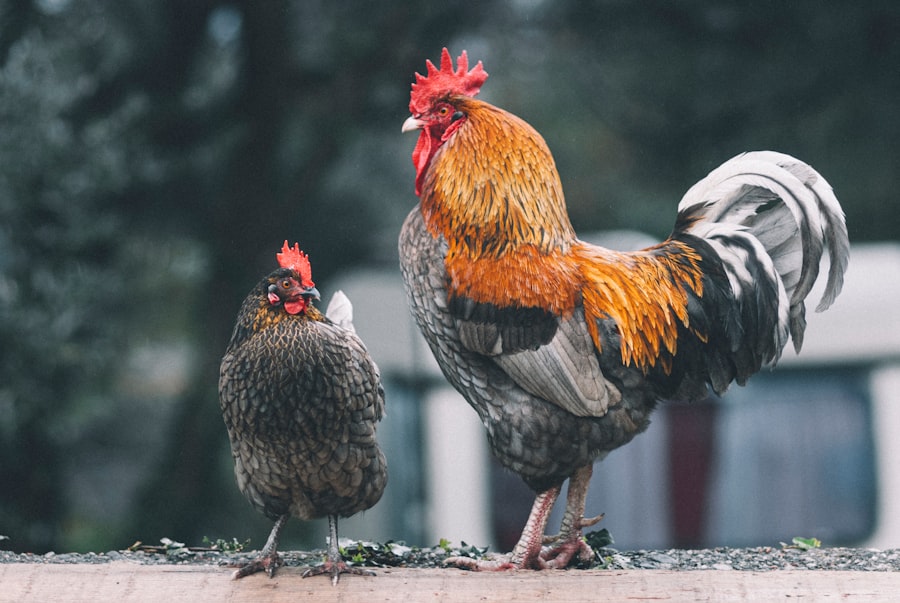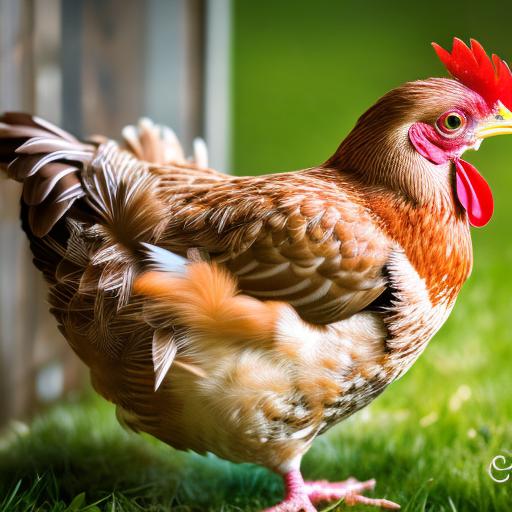Keeping chickens indoors is a growing trend, especially in urban areas where space is limited. It allows people to enjoy the benefits of having fresh eggs readily available, without the need for a large backyard or rural property. Indoor chicken keeping also offers convenience and the potential for reduced pest problems. In this article, we will explore the benefits, challenges, and considerations of keeping chickens indoors.
Key Takeaways
- Keeping chickens indoors can be a great option for those with limited outdoor space or in urban areas.
- Benefits of indoor chicken keeping include fresh eggs, natural pest control, and companionship.
- When choosing a chicken coop for indoor keeping, consider size, ventilation, and ease of cleaning.
- Setting up your indoor chicken coop requires bedding, nesting boxes, and perches.
- Feeding and providing water for indoor chickens requires a balanced diet and clean water sources.
Benefits of Keeping Chickens Indoors
One of the main benefits of keeping chickens indoors is having fresh eggs readily available. Instead of relying on store-bought eggs, you can simply walk to your indoor coop and collect fresh eggs every day. This not only ensures that you have a constant supply of high-quality eggs, but it also allows you to have a closer connection to your food source.
Another benefit of indoor chicken keeping is the convenience it offers. With chickens indoors, you don’t have to worry about predators or extreme weather conditions affecting their well-being. You also have easier access to them for feeding, cleaning, and monitoring their health. Additionally, indoor chickens are less likely to cause damage to your garden or landscaping.
Keeping chickens indoors can also help reduce pest problems. Chickens are natural pest control agents and can help keep your home free from insects and other pests. By having them indoors, you can target specific areas where pests are a problem and allow the chickens to do their job.
Choosing the Right Chicken Coop for Indoor Keeping
Choosing the right chicken coop is crucial for indoor chicken keeping. There are different types of coops available, including traditional wooden coops, plastic coops, and even DIY options. When selecting a coop, consider factors such as size, ventilation, and ease of cleaning.
The size of the coop is important because chickens need enough space to move around comfortably. The general rule of thumb is to provide at least 4 square feet per chicken. However, if you have larger breeds or plan to keep more chickens, you may need a larger coop.
Proper ventilation is essential for indoor chicken keeping. Chickens produce moisture and ammonia through their droppings, which can lead to respiratory issues if not properly ventilated. Make sure the coop has windows or vents that can be opened and closed as needed.
Cleaning the coop is another important consideration. Look for coops that have removable trays or easy access to the floor for cleaning. This will make it easier to maintain a clean and healthy environment for your indoor chickens.
Setting Up Your Indoor Chicken Coop
Setting up your indoor chicken coop properly is crucial for the health and well-being of your chickens. Proper ventilation and lighting are essential for their overall comfort and productivity.
Ventilation is important to ensure that the air inside the coop is fresh and free from excessive moisture and ammonia. This can be achieved by having windows or vents that can be opened and closed as needed. It’s also important to provide adequate airflow without creating drafts that can cause temperature fluctuations.
Lighting is another important aspect of setting up your indoor chicken coop. Chickens require a certain amount of light to lay eggs consistently. You can use natural light from windows or provide artificial lighting using LED bulbs. Aim for around 14-16 hours of light per day to encourage egg production.
In addition to ventilation and lighting, it’s important to provide a comfortable environment for your indoor chickens. This includes providing roosting bars for them to perch on, nesting boxes for laying eggs, and bedding material such as straw or wood shavings for them to nest in.
Feeding Your Indoor Chickens
Feeding your indoor chickens a balanced diet is crucial for their health and productivity. There are different types of feed available, including commercial pellets, grains, and kitchen scraps.
Commercial pellets are a convenient option as they are formulated to provide all the necessary nutrients for chickens. Look for high-quality pellets that are specifically formulated for laying hens. You can also supplement their diet with grains such as corn or wheat.
Kitchen scraps can also be fed to indoor chickens, but it’s important to avoid feeding them anything that is toxic or harmful to their health. Avoid feeding them onions, garlic, chocolate, avocado, and any spoiled or moldy food. It’s also important to provide fresh water and grit for digestion.
Providing Water for Indoor Chickens

Providing clean water for your indoor chickens is essential for their health and well-being. Chickens need access to fresh water at all times to stay hydrated and maintain proper bodily functions.
There are different types of waterers available, including gravity-fed waterers, nipple waterers, and automatic waterers. Gravity-fed waterers are the most common and simplest option. They consist of a container that holds the water and a tray or trough that the chickens can drink from.
Nipple waterers are another option that provides a more hygienic way of providing water. They consist of small nipples that release water when the chickens peck at them. This helps prevent contamination of the water by droppings or debris.
Regardless of the type of waterer you choose, it’s important to monitor water consumption. Chickens can consume a surprising amount of water, especially during hot weather or when they are laying eggs. Make sure the waterer is always clean and filled with fresh water.
Maintaining a Clean Indoor Chicken Coop
Maintaining a clean coop is crucial for the health and well-being of your indoor chickens. A clean coop helps prevent the buildup of bacteria, parasites, and disease-causing organisms.
There are different cleaning methods available, including deep cleaning and spot cleaning. Deep cleaning involves removing all the bedding material, scrubbing the coop with a mild detergent or disinfectant, and allowing it to dry before adding fresh bedding.
Spot cleaning involves removing any visible droppings or soiled bedding on a regular basis. This can be done using a small rake or shovel. It’s important to spot clean daily or every few days to prevent the buildup of waste.
In addition to cleaning, it’s important to monitor the coop for pests and disease. Regularly check for signs of mites, lice, or other parasites. Keep an eye out for any signs of illness in your chickens, such as changes in behavior, appetite, or egg production. If you notice any issues, consult a veterinarian who specializes in poultry health.
Keeping Indoor Chickens Healthy
Keeping your indoor chickens healthy is crucial for their overall well-being and productivity. There are different health issues that can arise, including respiratory infections, egg binding, and nutritional deficiencies.
Respiratory infections can occur if the coop is not properly ventilated or if there is a buildup of ammonia from droppings. Make sure the coop has adequate ventilation and clean the coop regularly to prevent respiratory issues.
Egg binding is another common health issue in laying hens. It occurs when an egg gets stuck in the hen’s reproductive tract and cannot be laid. This can be caused by various factors, including poor nutrition, stress, or genetic predisposition. Provide a balanced diet and monitor your chickens for any signs of egg binding, such as straining or lethargy.
Nutritional deficiencies can also occur if your chickens are not receiving a balanced diet. Make sure they have access to high-quality feed that is specifically formulated for laying hens. You can also supplement their diet with kitchen scraps or treats, but make sure they are safe and healthy for chickens to consume.
Dealing with Noise and Odor from Indoor Chickens
One potential challenge of keeping indoor chickens is the potential for noise and odor. Chickens can be noisy, especially when they are laying eggs or if they feel threatened. They can also produce a strong odor, especially if the coop is not properly ventilated or cleaned.
To minimize noise, consider using soundproofing materials in the coop or placing the coop in an area that is less likely to disturb your neighbors. You can also provide distractions for your chickens, such as toys or treats, to keep them occupied and reduce noise.
To minimize odor, make sure the coop is properly ventilated and cleaned regularly. Remove any soiled bedding or droppings on a regular basis and replace it with fresh bedding. Consider using odor-absorbing materials, such as baking soda or activated charcoal, to help control odors.
It’s also important to be a considerate neighbor when keeping indoor chickens. Communicate with your neighbors about your plans to keep chickens indoors and address any concerns they may have. Be mindful of noise levels and take steps to minimize any potential disturbances.
Is Indoor Chicken Keeping Right for You?
In conclusion, keeping chickens indoors offers many benefits, including having fresh eggs readily available, convenience, and reduced pest problems. However, it also comes with challenges, such as proper coop selection, maintenance, and potential noise and odor issues.
Before deciding to keep indoor chickens, consider your lifestyle and living situation. Make sure you have enough space for a suitable coop and are willing to commit to the care and maintenance of the chickens. It’s also important to check local regulations and restrictions regarding indoor chicken keeping.
If you decide that indoor chicken keeping is right for you, embrace the experience and enjoy the benefits of having fresh eggs and the companionship of these fascinating creatures. Share your experiences with others and encourage them to consider indoor chicken keeping as well.
If you’re interested in keeping chickens inside your home, you may also want to check out this informative article on the Poultry Wizard website about the importance of providing a suitable coop for turkeys. The article titled “Do Turkeys Need a Coop?” discusses the specific requirements and considerations for housing turkeys, including the size and design of the coop, ventilation, and flooring options. To learn more about creating a comfortable living space for your feathered friends, click here.
FAQs
Can you keep chickens inside?
Yes, you can keep chickens inside, but it requires proper planning and preparation.
What are the benefits of keeping chickens inside?
Keeping chickens inside can protect them from predators, harsh weather conditions, and diseases. It also allows for easier access to eggs and easier maintenance of the coop.
What are the challenges of keeping chickens inside?
The main challenges of keeping chickens inside are providing adequate space, ventilation, and lighting. Chickens also produce a lot of waste, which needs to be managed properly to prevent odors and health hazards.
What kind of space do chickens need inside?
Chickens need at least 2-3 square feet of space per bird inside the coop. They also need access to an outdoor run or space to stretch their legs and get fresh air.
What kind of lighting do chickens need inside?
Chickens need 14-16 hours of light per day to lay eggs consistently. This can be provided through natural light or artificial lighting.
What kind of ventilation do chickens need inside?
Chickens need proper ventilation to prevent the buildup of ammonia and other harmful gases. This can be achieved through windows, vents, or fans.
What kind of bedding should be used inside the coop?
Chickens need a dry and absorbent bedding material, such as straw, wood shavings, or sand. The bedding should be changed regularly to prevent odors and health hazards.
What kind of food and water should be provided inside?
Chickens need access to clean water and a balanced diet that includes protein, carbohydrates, and vitamins. This can be provided through commercial feed or a combination of feed and kitchen scraps.
Meet Walter, the feathered-friend fanatic of Florida! Nestled in the sunshine state, Walter struts through life with his feathered companions, clucking his way to happiness. With a coop that’s fancier than a five-star hotel, he’s the Don Juan of the chicken world. When he’s not teaching his hens to do the cha-cha, you’ll find him in a heated debate with his prized rooster, Sir Clucks-a-Lot. Walter’s poultry passion is no yolk; he’s the sunny-side-up guy you never knew you needed in your flock of friends!







